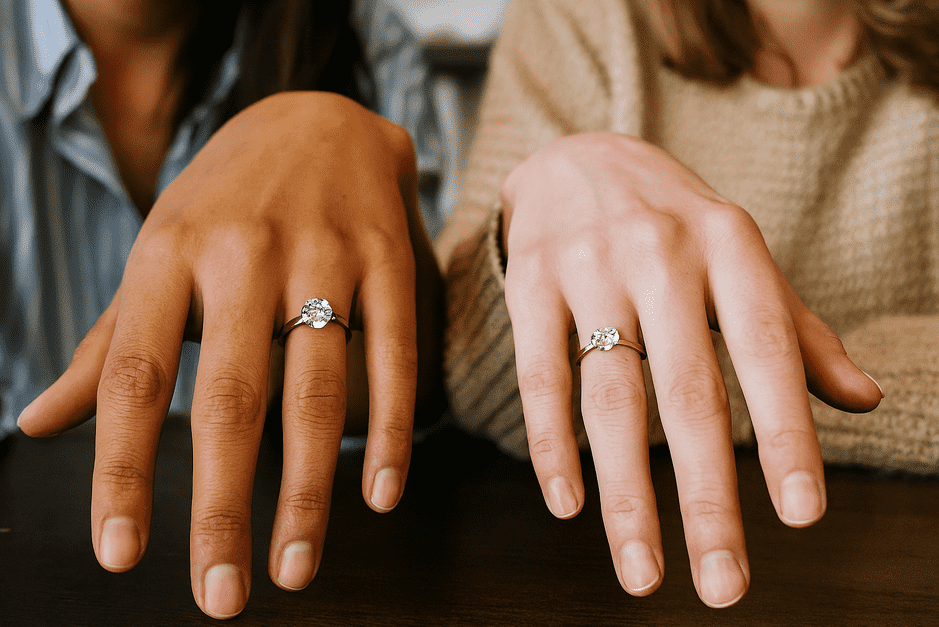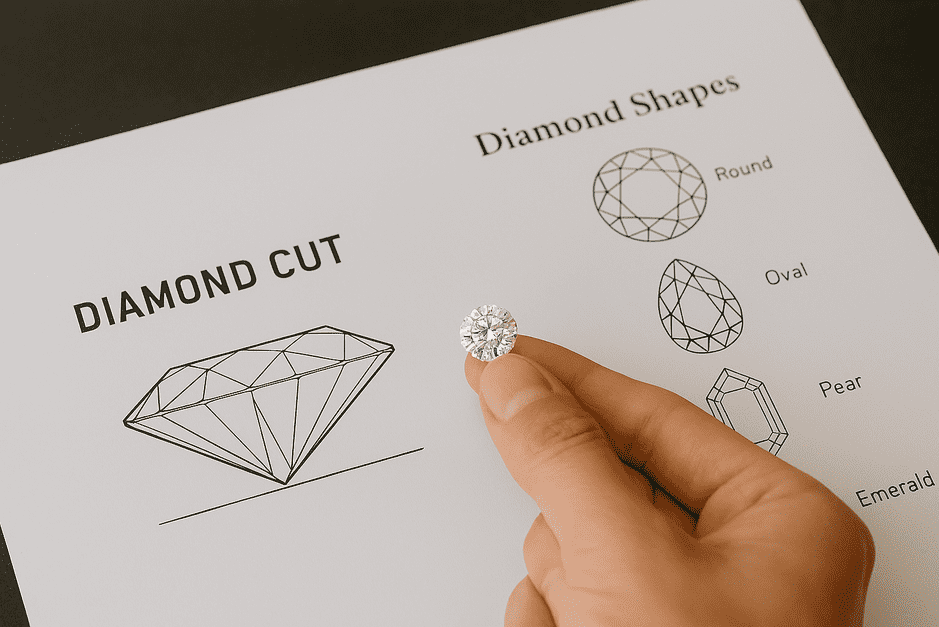Buying a diamond is deeply personal. Yet many buyers fall into what I call “the comparison curse.” The moment a friend shows off their engagement ring, the thought comes: “I want mine to be bigger, clearer, or better.”
The truth is simple: every diamond is unique, just like every buyer’s story. Chasing someone else’s stone often leads to disappointment or overspending. The goal is not to outshine your friend—it’s to find a diamond that matches your taste, budget, and lifestyle.
The Emotional Trap of Comparison
Research shows that 42% of diamond buyers admit comparing their purchase to someone else’s ring. This behavior often drives impulsive decisions and inflated budgets.
As an expert with 40+ years in gemology and the diamond trade, I’ve seen clients regret buying a “status” stone instead of the right one for them.
The key is this: Your diamond should reflect your values, not your neighbor’s.
Case Example
One client came to me after buying a 2-carat diamond just to keep up with her friend. A year later, she traded it for a smaller, better-cut diamond that actually looked brighter and matched her taste.
This is proof that size or “social comparison” is never the full story.
Practical Advice
- Focus on cut and brilliance over size. A well-cut 1.5-carat can outshine a poorly cut 2-carat.
- Set your budget first. Avoid spending just to match someone else’s stone.
- Look for certification. Always buy diamonds with GIA or AGS grading reports.
- Think about wearability. Choose what feels comfortable for daily life, not just for social media photos.
FAQ
Q: Why do people compare their diamonds to others?
A: Because jewelry is emotional and visible. But comparison often leads to overspending.
Q: Can a smaller diamond look better than a larger one?
A: Yes. A well-cut smaller diamond often has more sparkle than a larger but poorly cut one.
Q: What is the smartest factor to prioritize?
A: Cut quality. Research shows cut contributes up to 60% of a diamond’s sparkle.
Q: Should I buy the same diamond shape as my friend?
A: No. Choose a shape that flatters your hand and fits your personal style.
Suggested reading:
How to Budget for an Engagement Ring
Understanding Diamond Quality Factors
Small Luxury Hotels FAQ
Introduction
This small luxury hotels FAQ answers common questions about boutique stays. It explains definitions, differences with large chains, and which services to expect. In addition, it covers family options, sustainability, and tips on finding the right property.
What defines a small luxury hotel?
- Fewer than 100 rooms.
- Personalized attention and privacy.
- Strong links to local design.
- Locations in unique urban or rural areas.
As a result, travelers often choose them for a more intimate experience. Moreover, their distinctive style sets them apart from standardized hotels.
Why choose a small luxury hotel?
Personal service
Staff remember guest details, therefore creating a sense of familiarity.
Calm spaces
Unlike large hotels, these properties feel quieter, so you can relax more easily.
Local culture
For example, menus highlight regional produce, and interiors reflect local crafts.
In addition, many guests return because the experience feels authentic.
How do small luxury hotels differ from large chains?
Guest experience
Small hotels provide tailored attention, while chains rely on uniform systems.
Property identity
Each boutique hotel has its own theme. On the other hand, large chains repeat formats worldwide.
Dining approach
Menus change seasonally and locally. Therefore, guests enjoy fresh variety instead of standard global menus.
Are small luxury hotels only for leisure stays?
Business features
- Lounges double as meeting rooms.
- Private dining options support work dinners.
Digital needs
- Fast Wi-Fi supports remote work.
- Quiet spaces help concentration.
Because of these advantages, small luxury hotels appeal to both business and leisure travelers.
What services can you expect?
- Concierge services for tours and dining.
- Fine dining menus with seasonal ingredients.
- Spa and wellness treatments.
- Added extras like minibars and welcome gifts.
Moreover, services shift depending on location. For example, a city hotel might offer cultural tours, while a rural retreat offers farm experiences.
Are small luxury hotels family-friendly?
Options for families
- Connecting rooms for parents and children.
- Child-friendly amenities such as menus or games.
Adults-only stays
- Some properties focus on privacy.
- Guests find peaceful, child-free environments.
Therefore, always check booking policies, because each hotel sets its own approach.
Do these hotels support sustainability?
Sourcing and dining
Farm-to-table meals reduce transport impact. In addition, guests enjoy fresher produce.
Environmental focus
Plastic use is restricted, while refillable bottles are encouraged. Smart energy systems reduce wastage.
Local involvement
Hotels support the community by hiring regionally. As a result, growth extends beyond the property.
How do you find the right small luxury hotel?
Define needs
Decide if food, spa, culture, or privacy is your top priority.
Check guest feedback
For example, repeat reviews about service often signal consistency.
Compare value
Packages may include meals, transfers, or early check-in. Therefore, higher prices can still deliver stronger value.
Are small luxury hotels worth the price?
Value of service
Guests pay for attention, comfort, and privacy. Moreover, experiences feel tailored and unique.
Extras add value
Some hotels include exclusive experiences or benefits. Finally, weigh these extras against nightly rates.
As a result, many travelers feel these hotels justify their price when quality matters most.



